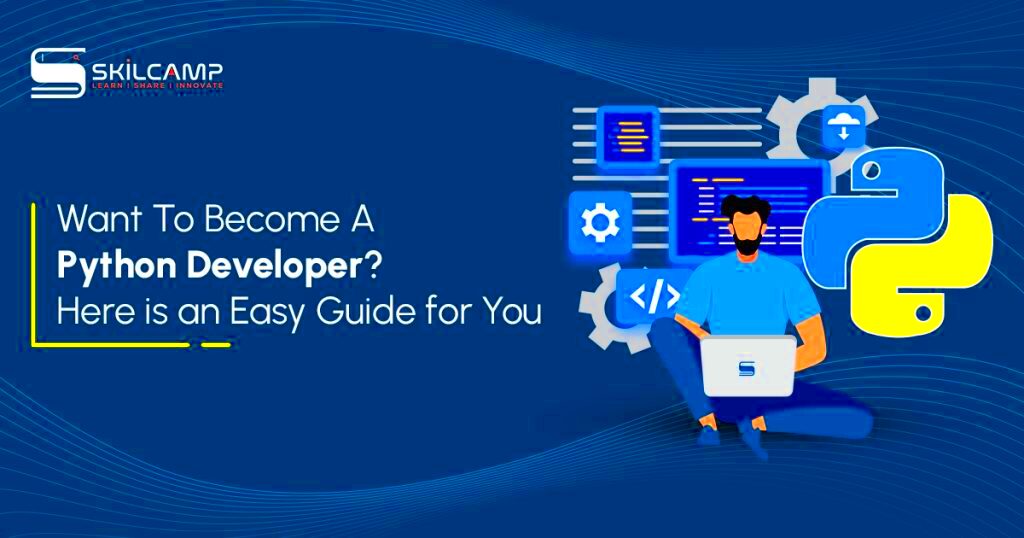Are you thinking about becoming a freelance Python developer but don't have a degree? The good news is that it's absolutely possible. Freelance development gives you the freedom to work on projects that interest you, set your own schedule, and earn a competitive income. Python is one of the most popular programming languages in the world, and it's in high demand in many industries. Whether you want to create web applications, automate tasks, or analyze data, Python is a versatile tool that can open many doors for you. In this post, we'll explore how you can start your freelance career in Python without a degree and succeed in the competitive freelance marketplace.
Why Python is a Great Choice for Freelancing

Python stands out as one of the best languages for freelance developers due to its versatility, ease of use, and wide range of applications. Here's why Python is a fantastic choice:
- Easy to Learn: Python is known for its simple and readable syntax, making it a great option for beginners and experienced developers alike.
- High Demand: Python is used in various fields, including web development, data analysis, machine learning, automation, and more. This wide application means plenty of freelance job opportunities.
- Community Support: Python has a massive, active community. You can always find resources, tutorials, forums, and advice to help you improve your skills.
- Flexible Freelance Work: Whether you're building websites, developing software, or writing automation scripts, Python can handle a variety of freelance projects, making it a great way to diversify your freelance portfolio.
With these advantages, it's no wonder Python remains a top choice for freelance developers worldwide.
Also Read This: How to Approve Seller Profile on Fiverr
Skills You Need to Become a Freelance Python Developer

To succeed as a freelance Python developer, you'll need more than just Python programming skills. Here are the essential skills you should focus on:
- Proficiency in Python: Understand the fundamentals of Python, including syntax, data types, loops, functions, and object-oriented programming.
- Web Development Knowledge: If you're interested in web development, learning frameworks like Django or Flask will allow you to build dynamic websites and web apps.
- Version Control: Familiarize yourself with Git, a version control system that is essential for collaborating with clients and teams.
- Database Management: Understanding how to work with databases like MySQL, PostgreSQL, or NoSQL databases like MongoDB will help you manage data effectively in your projects.
- Problem-Solving Skills: As a freelancer, you'll often encounter complex challenges. Strong problem-solving skills will help you troubleshoot and deliver high-quality results.
- Communication Skills: Effective communication with clients is key to understanding their requirements and delivering the best solution. You’ll need to explain technical concepts in a way that clients can understand.
- Time Management: Being a freelancer means you'll be juggling multiple projects. Strong time management skills will help you stay organized and meet deadlines.
Developing these skills will make you a more competitive freelance Python developer and help you deliver better results to your clients.
Also Read This: How to Write Reviews on Fiverr
How to Build a Strong Portfolio Without a Degree

Building a solid portfolio as a freelance Python developer is key to attracting clients, even if you don't have a degree. Your portfolio is your digital resume and often the first thing potential clients will check before hiring you. Here’s how you can build one without formal qualifications:
- Start with Personal Projects: Create projects that showcase your Python skills. These could be anything from a simple web app to a machine learning model or a data analysis project. Focus on quality and demonstrating your ability to solve real-world problems.
- Contribute to Open Source: Get involved in open-source projects. Platforms like GitHub allow you to collaborate with other developers and contribute to projects that are seen by a global audience. This is a great way to build credibility.
- Freelance Platforms: Sign up for freelancing platforms like Fiverr, Upwork, or Freelancer. Even if you're just starting, completing small tasks or projects can help you build your portfolio and gain reviews.
- Build a Personal Website: A personal website is a great way to present your work. Include case studies, detailed descriptions of your projects, and links to your GitHub or other repositories. A well-organized portfolio shows professionalism and makes it easier for potential clients to evaluate your skills.
- Get Client Testimonials: Even if you start with small or low-paid projects, ask satisfied clients for reviews or testimonials. Positive feedback adds credibility and shows your skills in a real-world setting.
By showcasing your work through personal projects, open-source contributions, and freelance gigs, you’ll be able to build a portfolio that demonstrates your value as a Python developer, no degree required!
Also Read This: How Much Does Fiverr Business Cost? An In-Depth Guide
Finding Freelance Opportunities as a Python Developer
Finding freelance opportunities as a Python developer requires a combination of networking, using job platforms, and creating a personal brand. Here’s a guide to help you land your first (or next) freelance gig:
- Join Freelance Platforms: Websites like Fiverr, Upwork, and Freelancer are great places to find freelance jobs. Create a strong profile highlighting your Python skills, experience, and past projects. These platforms allow clients to post job offers, and you can pitch your services in response.
- Leverage Social Media: Social media platforms like LinkedIn, Twitter, and even Reddit can help you connect with potential clients. Share your projects, engage with others in the tech community, and participate in discussions related to Python development.
- Attend Networking Events: Many freelance developers find work by attending meetups, webinars, or conferences. These events provide great opportunities to meet potential clients and other developers who can refer you to projects.
- Join Online Communities: Forums and communities like Stack Overflow, Python Reddit, and GitHub are great for finding freelance gigs. Many businesses post jobs in these communities, and it’s a chance to prove your expertise by helping others solve problems.
- Build a Reputation: The more projects you complete successfully, the better your reputation will be. Make sure to communicate well with clients, meet deadlines, and deliver quality work. Positive feedback and referrals will increase your chances of getting more opportunities.
Finding freelance opportunities is about being proactive. Use a combination of platforms, networking, and building your reputation to attract clients.
Also Read This: How to Contact a Buyer on Fiverr
Setting Your Rates and Managing Projects
One of the most important aspects of freelancing is determining how much to charge and managing your projects efficiently. Here are some tips to help you set fair rates and stay on top of your work:
- Research Market Rates: Before setting your rates, research what other Python developers charge. Rates can vary depending on experience, location, and the complexity of the work. For example, a simple script might cost less than building a full-fledged web application. Aim for a competitive but fair rate based on your skills and the type of work.
- Hourly vs. Fixed Rate: Decide whether to charge hourly or a fixed rate for projects. Hourly rates are common for ongoing work or when the scope is unclear. Fixed rates are better for projects with a defined scope and timeline. Choose what works best for you and your client.
- Estimate Project Time: Be realistic about how long a project will take. Factor in research, coding, testing, and client feedback time. Avoid undercharging by accounting for all aspects of the work.
- Use Project Management Tools: Tools like Trello, Asana, or Jira can help you stay organized. These tools allow you to track tasks, deadlines, and client feedback. Staying organized will help you manage multiple projects efficiently.
- Set Clear Expectations: Communicate openly with clients about timelines, deliverables, and payment terms. Having a clear contract that outlines the project scope, deadlines, and payment schedule will prevent misunderstandings and ensure smooth project management.
- Get Paid on Time: Establish payment milestones (e.g., deposit, progress payments, final payment) to ensure you get paid for your work. Don’t be afraid to enforce your payment terms professionally if a client delays payment.
By setting fair rates, being organized, and maintaining clear communication, you can manage your freelance projects effectively and ensure a steady stream of income.
Also Read This: Understanding the Impact of TOS Warnings on Fiverr: How Many Can You Receive?
Common Challenges and How to Overcome Them
Freelancing as a Python developer can be rewarding, but it also comes with its own set of challenges. Being aware of these hurdles and having strategies to overcome them will help you stay on track and continue growing your career. Here are some common challenges you may face:
- Finding Consistent Work: One of the biggest challenges as a freelancer is securing a steady stream of projects. To overcome this, you need to be proactive. Regularly check job platforms, pitch to potential clients, and keep your portfolio updated.
- Dealing with Difficult Clients: Not all clients will be easy to work with. Some may delay payments, change requirements frequently, or have unrealistic expectations. Set clear boundaries and agreements upfront. A well-written contract can protect you from these issues.
- Managing Multiple Projects: Balancing multiple projects can quickly become overwhelming, especially when deadlines start to overlap. Use project management tools like Trello or Asana to keep everything organized. Prioritize tasks, and don't hesitate to communicate delays to clients if necessary.
- Staying Motivated: Freelancers often work from home, which can lead to distractions and a lack of motivation. Set a routine and create a dedicated workspace. It’s also helpful to break tasks into smaller steps to make them feel more manageable.
- Setting Competitive Rates: Many beginners struggle with finding the right rate for their services. Research industry standards and adjust based on your experience level. Starting lower may help you gain clients, but be sure to gradually increase your rates as you gain more experience and build your reputation.
Overcoming these challenges is part of the freelance journey. By staying organized, communicating clearly, and remaining proactive, you can turn these obstacles into opportunities for growth.
Also Read This: How to Rate Your Fiverr Gig: A Comprehensive Guide
Conclusion: Your Path to Becoming a Successful Freelance Python Developer
Becoming a successful freelance Python developer without a degree is entirely possible. It takes dedication, learning, and the right mindset. You can start building a strong portfolio, gain experience through personal and freelance projects, and establish connections in the industry. The key to long-term success is continuous improvement: learning new Python frameworks, staying updated with industry trends, and adapting your approach based on client feedback.
Remember, success as a freelancer doesn’t come overnight. However, by staying committed to delivering quality work, building your brand, and seeking constant improvement, you’ll gradually gain more clients and establish a sustainable freelance career. Stay patient, keep growing, and you’ll achieve your goals.
Frequently Asked Questions
1. Do I need a degree to become a freelance Python developer?
No, you don't need a formal degree to become a successful Python developer. Many freelance developers are self-taught, with experience gained through personal projects, online courses, and open-source contributions. The most important thing is to demonstrate your skills through a strong portfolio and deliver quality work.
2. How can I set my rates as a beginner?
As a beginner, research what other Python developers charge on platforms like Upwork or Fiverr. You might start with lower rates to build your portfolio and gain reviews. Over time, as you gain more experience and positive feedback, you can gradually raise your rates.
3. What tools do I need to start freelancing as a Python developer?
You’ll need a reliable code editor like VS Code or PyCharm, version control tools like Git, and access to project management tools like Trello or Asana. A personal website and a professional profile on freelancing platforms will also help you attract clients.
4. How do I find clients as a freelance Python developer?
You can find clients through freelancing platforms, networking at industry events, and engaging with potential clients on social media or online communities like LinkedIn, Stack Overflow, and GitHub. Building a strong personal brand and having an online portfolio will help you attract more opportunities.
5. How do I handle multiple projects as a freelancer?
Managing multiple projects can be challenging, but with proper organization, it’s manageable. Use project management tools to track tasks and deadlines. Prioritize your tasks and communicate regularly with clients to ensure expectations are met. Keep a clear schedule and avoid overloading yourself.




